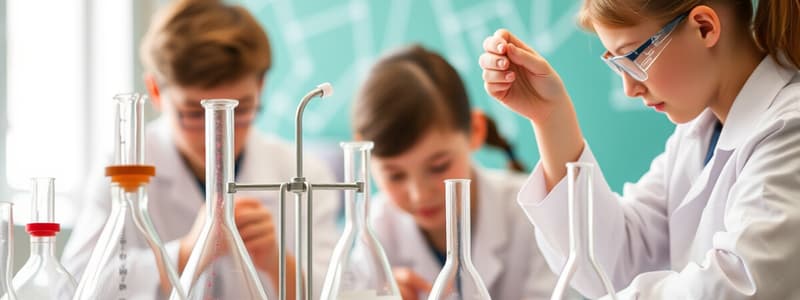Podcast
Questions and Answers
Which of the following is a consequence of increasing the temperature of a reaction at equilibrium?
Which of the following is a consequence of increasing the temperature of a reaction at equilibrium?
- The equilibrium constant remains unchanged.
- The reaction will shift towards the exothermic direction.
- The rate of the forward reaction decreases.
- The reaction will shift towards the endothermic direction. (correct)
What is the equivalent of one mole of a substance in terms of mass for an element with a molar mass of 58 g/mol?
What is the equivalent of one mole of a substance in terms of mass for an element with a molar mass of 58 g/mol?
- 58 grams (correct)
- 58 moles
- 116 grams
- 29 grams
Which of the following factors does not affect the rate of a chemical reaction?
Which of the following factors does not affect the rate of a chemical reaction?
- Concentration of reactants
- Presence of a catalyst
- Color of the reactants (correct)
- Temperature of the environment
Which of the following statements is true about redox reactions?
Which of the following statements is true about redox reactions?
What effect does a buffer solution have on the pH when a small amount of acid is added?
What effect does a buffer solution have on the pH when a small amount of acid is added?
Which law states that the total energy in an isolated system remains constant, although it may change forms?
Which law states that the total energy in an isolated system remains constant, although it may change forms?
Which of the following statements about stereoisomerism is correct?
Which of the following statements about stereoisomerism is correct?
What is the primary reason for the trend in electronegativity across the periodic table from left to right?
What is the primary reason for the trend in electronegativity across the periodic table from left to right?
Flashcards are hidden until you start studying
Study Notes
General Overview
- Chemistry Olympiad questions typically cover a wide range of topics in chemistry, including theoretical concepts, problem-solving, and practical applications.
Topics Covered
-
Stoichiometry
- Balancing chemical equations
- Calculating moles, mass, and volume relationships in reactions
-
Thermochemistry
- Laws of thermodynamics
- Enthalpy changes and calorimetry
- Hess's Law and standard enthalpy of formation
-
Kinetics
- Rate laws and reaction mechanisms
- Factors affecting reaction rates (temperature, concentration, catalysts)
-
Equilibrium
- Le Chatelier's principle
- Calculation of equilibrium constants (Kc, Kp)
- Acid-base equilibria and buffer solutions
-
Electrochemistry
- Redox reactions and balancing
- Electrochemical cells and Nernst equation
- Standard electrode potentials
-
Organic Chemistry
- Functional groups and nomenclature
- Reaction mechanisms (substitution, elimination, addition)
- Stereochemistry and isomerism
-
Inorganic Chemistry
- Periodic trends (ionization energy, electronegativity)
- Coordination compounds and ligands
- Transition metals and their properties
-
Physical Chemistry
- Gas laws and kinetic molecular theory
- Colligative properties (boiling point elevation, freezing point depression)
- Quantum chemistry basics (electron configuration, orbitals)
Problem-Solving Strategies
- Read questions carefully to identify key information.
- Break complex problems into smaller, manageable parts.
- Use dimensional analysis for unit conversions.
- Check answers for consistency with given data.
Common Question Formats
- Multiple choice questions (MCQs)
- Short answer questions
- Long-form problem-solving questions
- Laboratory-based scenarios or practical applications
Preparation Tips
- Practice past Olympiad questions to familiarize with the style and difficulty.
- Focus on understanding concepts rather than rote memorization.
- Collaborate with peers for group study sessions.
- Review laboratory techniques and safety procedures.
Resources
- Textbooks and review books specific to Olympiad preparation.
- Online practice quizzes and simulations.
- Chemistry forums and study groups for discussion and clarification.
General Overview
- Chemistry Olympiad encompasses a broad spectrum of chemistry topics, including theory, practical applications, and problem-solving.
Topics Covered
-
Stoichiometry
- Involves balancing chemical equations and calculating relationships among moles, mass, and volume.
-
Thermochemistry
- Focuses on the laws of thermodynamics, measuring enthalpy changes, and using calorimetry to determine thermal properties.
- Hess's Law allows calculation of enthalpy changes for reactions based on known values.
-
Kinetics
- Studies reaction rates and mechanisms, emphasizing how temperature, concentration, and catalysts influence these rates.
-
Equilibrium
- Utilizes Le Chatelier's principle to predict system changes and calculate equilibrium constants (Kc, Kp).
- Acid-base equilibria and buffer solutions are integral to this topic.
-
Electrochemistry
- Examines redox reactions, including balancing them and working with electrochemical cells.
- The Nernst equation and standard electrode potentials are critical concepts.
-
Organic Chemistry
- Covers essential topics like functional groups, nomenclature, and various reaction mechanisms.
- Focuses on stereochemistry and isomerism as vital aspects of organic compounds.
-
Inorganic Chemistry
- Analyzes periodic trends, including ionization energy and electronegativity.
- Discusses coordination compounds, ligands, and properties of transition metals.
-
Physical Chemistry
- Explores gas laws and the kinetic molecular theory.
- Investigates colligative properties like boiling point elevation and freezing point depression.
- Introduces quantum chemistry concepts including electron configurations and atomic orbitals.
Problem-Solving Strategies
- Read each question closely to extract pertinent details and key information.
- Simplify complex problems by breaking them into smaller components.
- Apply dimensional analysis for accurate unit conversions.
- Validate answers by ensuring they align with the provided data.
Common Question Formats
- Include multiple choice questions (MCQs), short answer questions, long-form problems, and laboratory simulations.
Preparation Tips
- Engage with past Olympiad questions to understand format and challenge levels.
- Prioritize comprehension of concepts over simple memorization for lasting knowledge retention.
- Participate in group study sessions to enhance learning through collaboration.
- Review necessary laboratory techniques and safety protocols to ensure familiarity.
Resources
- Utilize textbooks and specific review books tailored for Olympiad preparation.
- Access online quizzes and simulations for interactive practice.
- Join chemistry forums and study groups for ongoing discussion and clarification.
Studying That Suits You
Use AI to generate personalized quizzes and flashcards to suit your learning preferences.





